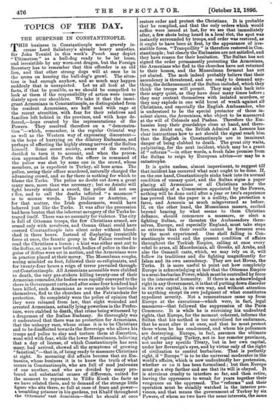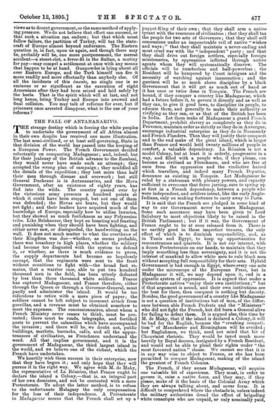TOPICS OF THE DAY.
THE SUSPENSE IN CONSTANTINOPLE. THIS business in Constantinople must gravely in- crease Lord Salisbury's already heavy anxieties. Sir John Tenniel in this week's Punch may depict " Ultimatum " as a bull-dog ready to be let loose, and irresistible by any worn-out dragon, but the Foreign Secretary has to remember that this offender is an old lion, and that other strong dogs will at once be in the arena on hearing the bull-dog's growl. The situa- tion is bad enough anyhow, and so much may happen suddenly that is unexpected. Let us all look at the facts, if that be possible, as we should be compelled to look at them if the responsibility of action were imme- diately upon our shoulders. We take it that the immi- grant Armenians in Constantinople, as distinguished from the resident Armenians, are half mad with rage at the recent atrocities, with fear for their relatives and families left behind in the province, and with hope de- ferred,—hope created by the representations of the Powers. They resolved therefore on a " demonstra- tion "—which, remember, is the regular Oriental way as well as the Western way of expressing discontent— in the hope of hurrying on the dilatory Embassies, and perhaps of affecting the highly strung nerves of the Sultan himself. Some secret society, aware of the resolve, decided to turn it to account, and when the proces- sion approached the Porte the officer in command of the police was shot by some one in the crowd, whose members, as is expedient in Turkey, all bore arms. The police, seeing their officer murdered, naturally charged the advancing crowd, and so far there is nothing for which to blame the Turks. The police no doubt cut down a great many men, more than was necessary ; but no Asiatic will fight bravely without a sword, the police did not use r-fles, and to call the deaths inflicted " a massacre " is to misuse words. The Italian or Austrian, or for that matter, the Irish gendarmerie, would have behaved just like the Turks. It was after the procession had been beaten that the inherent savagery of the Turks be- trayed itself. There was no necessity for violence. The city is full of Ottoman troops, the few Christians armed, are armed only with revolvers, and Osman Ghazi could have coerced Constantinople into silent order without blood- shed in three hours. Instead of displaying irresistible force at once, the fanatic group in the Palace resolved to read the Christians a lesson ; a hint was either sent out to the Softas, or, as is now believed, bodies of police in the dis- guise of Softas were set in motion, and the Armenians were in practice placed at their mercy. The Mussulman roughs, seeing mischief on foot, followed their co-religionists, and for twenty-four hours a reign of terror prevailed through- out Constantinople. All Armenians accessible were clubbed to death, the very gas-stokers killing twenty-one of their Armenian comrades,the bodies were rapidly conveyed to the shore in Government carts, and after some four hundred had been killed, such Armenians as were unable to barricade themselves, fled to the churches and the Patriarchate for protection. So completely were the police of opinion that they were released from law, that eight wounded and arrested Armenians, actually lying powerless in the Prefec- ture, were stabbed to death, that crime being witnessed by dragoman of the Italian Embassy. So thoroughly was it understood that there was no protection for Armenians, that the unhappy race, whose crime it is to be Christians and to be disaffected towards the Sovereign who allows his troops and police to slay and torture them at discretion, went wild with fear, while the lower Mussulmans, believing that a day of license, of which Constantinople has seen many, had arrived, showed all the symptoms of growing " fanatical,"—that is, of being ready to massacre Christians at sight. So menacing did affairs become that six Em- bassies, whose business it is to know the truth of what occurs in Constantinople, who are full of mad jealousies of one another, and who are divided by many pro- found and substantial causes of difference, united for the moment to represent to Yildiz Kiosk the facts as we have related them, and to demand of the strange little figure who sits there, so full at once of fears and power- s, trembling prisoner in his gardens, yet Khalif throughout the Ottomans' vast dominion—that he should at once restore order and protect the Christians. It is probable that he complied, and that the only orders which would suffice were issued at last, for we see that immediately after, a few shots being heard in a local riot, the spot was instantly surrounded by troops, and order was restored, as it ought to have been at first, by the appearance of irre- sistible force. " Tranquillity " is therefore restored in Con- stantinople ; but clearly the Embassies are not satisfied, and they have reason for their hesitation. The Sultan has not signed the order permanently protecting the Armenians, the Armenians who fled to the churches have not returned to their homes, and the Mussulman ferment has not yet abated. The mob indeed probably believe that their ascendency is threatened, and are ready to demand any- thing, the dethronement of the Sultan included, which they think the troops will permit. They may sink back into their angry quiet, as they have done many times before ; they may content themselves with isolated murders, or they may explode in one wild burst of wrath against all Christians, and especially the English Ambassador, who is understood to be the special protector of those in- solent slaves, the Armenians, who object to be massacred at the will of Colonels and Pashas. Therefore the Em- bassies keep their guardships close at hand, and there- fore, we doubt not, the British Admiral at Lemnos has clear instructions how to act should the signal reach him that the English in Constantinople are in imminent danger of being clubbed to death. The great city waits, palpitating, for the next incident, which may be a grant of " reforms "—in other words, a fresh false promise from the Sultan to reign by European advice—or may be a. catastrophe.
It is quite useless, almost impertinent, to suggest tilt that incident has occurred what next ought to be done. If, on the one hand, Constantinople sinks back into its normal condition of uneasy quiet, and the Sultan signs a paper placing all Armenians or all Christians under the guardianship of a Commission appointed by the Powers, nothing will be done until after a year or two's experience has proved that the paper is a nullity, the protection a farce, and Armenia as much misgoverned as before.. If, on the other hand, the Mussulman masses, excited beyond bearing by what seems to them Christian defiance, should commence a massacre, or elect a fighting Sultan, or threaten the Ambassadors them- selves, Europe, and especially England, must take steps so extreme that their results cannot be foreseen even by the most experienced. One shell falling in Con- stantinople would end the present condition of affairs throughout the Turkish Empire, calling at once every rebel to arms, all Macedonians, all Greeks, all Arabs, and also the Osmanli caste, which, we may rely on it, will follow its traditions and die fighting magnificently for Islam and its own ascendency. They are not Hovas, the Turks. It is more useful to point out how completely Europe is acknowledging at last that the Ottoman Empire is a semi-barbarian Power, which must be controlled by force in the interests of humanity. If there is an acknowledged right in any Government, it is that of putting down disorder in its own capital, in its own way, and without attention to anything except its own judgment of what constitutes expedient severity. Not a remonstrance came up from Europe at the executions—which were, in fact, legal massacres—that followed the suppression of the Paris Commune. It is while he is exercising his undoubted rights, that Europe, for the moment coherent, informs the Sultan that his method is too uncivilised for endurance, that he must alter it at once, and that he must protect those whom he has condemned, and whom his policemen are destroying. Europe, in fact, assumes the ultimate right of regulating Turkey, not in her remoter provinces, not under any specific Treaty, but in her own capital, under her Sovereign's eyes, and by virtue only of the right of civilisation to control barbarism. That is perfectly right, if " Europe " is to be the universal moderator in the world's affairs, which is now undoubtedly her pretension, whether or no it has been formulised ; but then Europe must go a step farther and see that its will is obeyed. It is atrocious cruelty to interfere so far, and then retire, leaving the oppressors to wreak for years together their vengeance on the oppressed. The " reforms " and their operation must be steadily watched in the interior pro- vinces, and that means the government of Turkey by six Powers, of whom no two have the same interests, the same views as to decent government, or the same method of apply- ing pressure. We do not believe that effort can succeed, or that such a situation can endure ; but that which must follow failure, the partition of Turkey, will tax the state- craft of Europe almost beyond endurance. The Eastern question is, in fact, upon us again, and though there may be, probably will be, one more postponement, the merest accident—a street-riot, a fever-fit in the Sultan, a mutiny for pay—may compel a settlement at once with any means that happen to be at hand. Gunpowder is lying about all over Eastern Europe, and the Turk himself can fire it more readily and more effectually than anybody else. Of all the incidents of this emeute, no single one is so ominous or so significant as the execution of eight Armenians after they had been seized and laid safely by the heels. That is the spirit which will at last, and not long hence, bring Turkey and Europe into avowed and final collision. You may talk of reforms for ever, but if prisoners once arrested disappear, what is the use of your reforms ?



















































 Previous page
Previous page